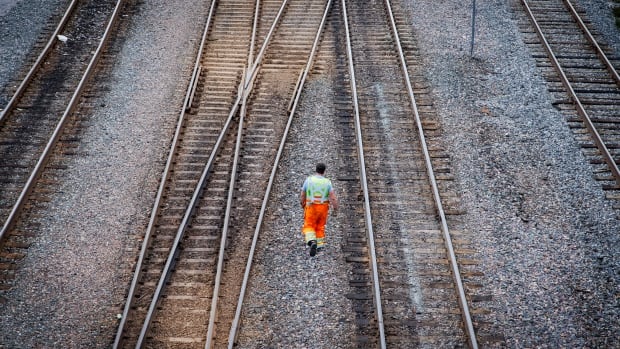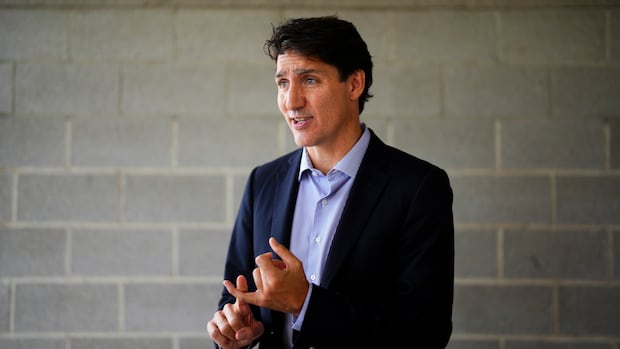
Facing calls to intervene to avoid a massive railway disruption in the coming hours, Prime Minister Justin Trudeau is instead urging the opposing parties to reach an agreement for the sake of Canadians and Canadian businesses.
Canada’s two main railway companies, Canadian National Railway (CN) and Canadian Pacific Kansas City (CPKC), are on the brink of locking out thousands of workers in the midst of simultaneous — and tense — labour negotiations.
The companies say they will start locking out workers in the early hours of Thursday if they cannot reach a deal with the union representing 9,300 engineers, conductors and yard workers. That would bring the roughly $1 billion worth of goods that move on the companies’ tracks every day to a sudden stop.
“My message is straightforward. It is in the best interest of both sides to continue doing the hard work at the table to find a negotiated resolution,” Trudeau said during brief remarks Wednesday.
“Millions of Canadians, of workers, of farmers, of businesses right across the country are counting on both sides to do the work to get a resolution.”
Prime Minister Justin Trudeau says it’s in ‘the best interest’ of CN Rail, CPKC and the Teamsters union ‘to continue doing the hard work at the table to find a negotiated resolution.’ Canada’s two main railway companies say they will start locking out workers Thursday if a deal is not reached, while the union says it is ready to call a strike for that day.
Earlier in the day, the Canadian Chamber of Commerce, the Business Council of Canada, the Canadian Federation of Independent Business and the Canadian Manufacturers & Exporters issued a joint statement calling on the federal government to take “immediate action” to keep trains and the goods they carry moving.
“The government of Canada has a responsibility to protect the Canadian public and maintain national security, and it is time to act decisively to fulfil that obligation,” said the statement.
They argue that under Article 107 of the federal labour code, Labour Minister Steven MacKinnon could refer the dispute to the Canada Industrial Relations Board for binding arbitration, and could prohibit a strike, a lockout or any ongoing stoppage pending a resolution.
The federal government could also reconvene Parliament and introduce back-to-work legislation, the groups say.
“This is not about siding with either party; it is about standing up for Canadians,” said the business organizations’ statement.
“The federal government must show leadership and act before our trains — and with them, our economy — grind to a halt. Otherwise, the steep price of inaction will be paid by Canadian families, workers and businesses.”
Minister called for both sides to come to an agreement
MacKinnon already has rejected CN’s request for binding arbitration and has instead urged the parties to hammer it out at the negotiating table.
The union has been demanding better wages, benefits and working conditions for workers.
The Teamsters Canada Rail Conference has claimed that CPKC wants to “gut the collective agreement of all safety-critical fatigue provisions.” The union says CN is foisting a relocation clause on employees that would force them to move across Canada for months at a time to fill labour shortages.
In a statement issued earlier this week, the Teamsters said that, so far, there have been “no meaningful advancements” in bargaining.
Barry Eidlin, associate professor and labour expert at McGill University, said Canada used to have a reputation for “being pretty trigger-happy” when it comes to imposing back-to-work legislation. That changed with the 2015 Supreme Court decision affirming the constitutional right to strike.
“We are in a different era,” Eidlin said. “This current Trudeau government does seem to take that right seriously, and has repeatedly stated that the best deals are negotiated at the bargaining table.”
He said there are drawbacks for both sides when binding arbitration is used.
“That, over time … erodes the confidence in the process,” he said. “And so it erodes the whole collective bargaining institution as a whole.”
Some commuter and VIA Rail lines would be affected
A phased shutdown of the railway networks is already underway. Transit authorities have said some commuter lines that run on CPKC tracks in Toronto, Montreal and Vancouver will be affected if dispatchers walk off the job.
VIA Rail, which operates on some CPKC-owned rail infrastructure, said it has negotiated continued access to a one-kilometre section of tracks in Smiths Falls, Ont., and will continue to operate its regular Ottawa–Toronto service if the lockdown goes ahead.
VIA Rail also said in a statement Thursday it will lose access to CPKC tracks for its Sudbury–White-River services and would have to suspend operations until the work stoppage is resolved.
The intercity passenger rail company said no other service would be affected.
U.S. Secretary of Transportation Pete Buttigieg said his department is closely monitoring the negotiations and any potential impacts on the flow of goods across the border.
“We are engaging with our Canadian counterparts and tracking the flow of vital goods to U.S. consumers and businesses,” he posted on social media.
